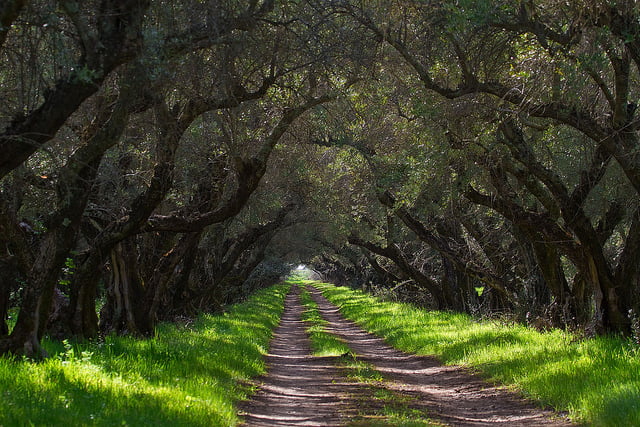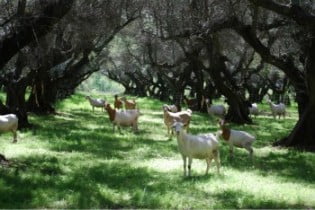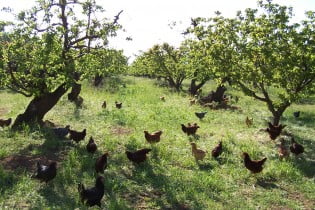 When I was working on yesterday's post, Living the Dream, the Life of a Businessman Farmer, an interview with Chris Kerston, I asked him if he could send me a short one-paragraph blurb on how quality olive oil is different from what we can buy at the grocery store. (You won't believe the similarities between olive trees and our immune systems…yes, you read that right…)
When I was working on yesterday's post, Living the Dream, the Life of a Businessman Farmer, an interview with Chris Kerston, I asked him if he could send me a short one-paragraph blurb on how quality olive oil is different from what we can buy at the grocery store. (You won't believe the similarities between olive trees and our immune systems…yes, you read that right…)
No big surprise, as with everything else, you get what you pay for.
Here's the “short one-paragraph” reply from Chris:
Our farm is not ‘certified' organic and we are not allowed to even compare ourselves to the term without risk of massive fines, unless we pay membership fees and undergo huge amounts of paperwork. All of that extra cost of certification has nowhere to get passed onto other than onto the consumer, and we believe that customers are smart enough to make their own choices and self-certify their foods when buying directly from the grower. We take a ‘non-toxic' (a term not trademarked and owned by the government) approach to farming. We believe healthy soil and a robust active ecosystem minimize the need for outside inputs.
Here’s why it's better NOT to buy olive oil in the grocery store:
The olive trees on this property are part of the largest old growth planting of olives in North America. The older trees, like old vine in the wine world, make better quality oils, with better flavor, and with some research showing even higher polyphenols (antioxidants). We grow an heirloom variety of olive that is traditionally only grown in California, called the Mission Olive. It’s known for having superb oil, and when harvested late in the season can produce some the of the most buttery, mildest, most pleasurable oil you’ll ever find. (Note from Kelly: try this oil in homemade mayo!)
What you get in the grocery store that is imported from other countries has shown time and time again that it's often adulterated with other lower grade vegetable oils. The domestic olive oil industry has literally put millions of dollars into research toward developing a test that can be done at customs as the boats come into the harbor. Unfortunately, a timely, reliable, affordable test that customs agents could effectively administer has not yet been developed. So I’d be pretty leery of imported oils for this reason. Read the article Slippery Business for a more in depth report of the corruption that goes on here.
U.S. olive oil, however, which is mostly grown in California, does really well in testing negative for any adulteration. But because the demand for olive oil is SO high, the industry is trying to compensate by finding ways to mechanize a very old world style of growing. The process of high density olive oil production has been gaining in popularity for the last 10 years. High density plantings mean that the young trees are trained onto a trellis, and not allowed to grow
into a traditional tree. They use a large combine tractor, similar to a mechanical grape harvester, that drives over the olive trellis and uses fingers and shakers to rattle the olives loose and then suck them up into a hopper. Watch this video of one of these machines in action. Many of the major domestic brands in stores now are from huge high density plantings.
There are a couple of major downsides to this system.
It requires heavy machinery and displaces a culture of farmers where hand harvesting skills have been passed down for generations. The tractors are much harder on the trees than manual harvesting and these high density trees usually have to be replaced every 15 to 20 years, never given the opportunity to get to the old growth stage. Because of the heavy machinery, this style of farming is also heavily dependent on petroleum which has added environmental impacts and is an unstable economical commodity at best.
The even more important part of this is that the amount of olives planted per acre in this high density system is really more than the soil can support naturally.
So where in traditional olive growing very little if any chemicals are used, high density olive oil production is notorious for leaning much more on a synthetic chemical program to prop up fertility, kill weeds, and eliminate bugs. So now you have to deal with chemical residue issues (by the way many of these chemicals are fat soluble, which doesn’t bode well for a product like an oil). Because the high density trees are spoon fed by chemicals, the trees themselves don’t have to build defenses or struggle as hard to grow the fruit.
It’s this struggling process where the trees develop their antioxidants, which are in essence defense mechanisms against disease, pests, fungus, etc. It’s the reason that these compounds are beneficial to ingest; they’ve been shown to do the same things in our bodies.
But when the trees don’t have to struggle, or be as self sufficient, they don’t put the same amount of energy into building these precious defense compounds which are part of what make olive oil good for you in the first place. (Another note from Kelly: Isn't this CRAZY cool? Doesn't it remind you of our own immune systems, how they need to struggle to get over illnesses in order to be stronger?!)
So like any farm fresh product you’d buy, I’d put olive oil in the category with something that it’s really important to know the producer.
Talk to them on the phone, email them, visit their website, and learn as much as you can. But there’s a lot of misinformation about olive oil out there so it can be a challenge to get good information. We’re one of the very few, if not the only farm, that can offer this integrated permaculture style farming, the nutrient rich volcanic soils, the old growth trees, the traditional harvesting styles of collecting the fruit, the heirloom Mission Olives, the respect and understanding of Weston Price principles, and a dedication to this caliber of artisanal extra virgin olive oil.”
Wow, you've got me convinced. Thanks Chris!


 into a traditional tree. They use a large combine tractor, similar to a mechanical grape harvester, that drives over the olive trellis and uses fingers and shakers to rattle the olives loose and then suck them up into a hopper. Watch this video of one of these machines in action. Many of the major domestic brands in stores now are from huge high density plantings.
into a traditional tree. They use a large combine tractor, similar to a mechanical grape harvester, that drives over the olive trellis and uses fingers and shakers to rattle the olives loose and then suck them up into a hopper. Watch this video of one of these machines in action. Many of the major domestic brands in stores now are from huge high density plantings.  So like any farm fresh product you’d buy, I’d put olive oil in the category with something that it’s really important to know the producer.
So like any farm fresh product you’d buy, I’d put olive oil in the category with something that it’s really important to know the producer. 
Superfancy says
Article and photos make me want to drink a glass of the stuff right now!
One but.
The article begins by stating that : “Our farm is not ‘certified’ organic and we are not allowed to even compare ourselves to the term without risk of massive fines, unless we pay membership fees and undergo huge amounts of paperwork….” OK, we get it, they aren’t certified organic but they are “non toxic”. So scroll down to the last image, a sandwich board sign advertising the farm’s product. It clearly states, “Organically Farmed.” Am I missing something — why on earth would they write that?
Chris Kerston says
It’s an old picture from a sign before we informed we couldn’t use the term.
Commenter via Facebook says
@Janis Spencer: you are seriously misinformed. Proper nutrition is about nutrient-density, not avoiding calories, especially not avoiding fat calories. Seeds and nuts have their place, but they are very high in phytic acid, and even if properly treated (soaked in salted water before drying), they contribute to interfering with mineral absorption, a huge health problem for Americans.
You seem to believe the nonsense that cholesterol causes heart disease and cancer. Nothing could be further from the truth. Cholesterol is an essential substance made by the body if we don’t consume it in sufficient quantities. It’s the raw material for the myelin sheath that protects nerve endings, for our hormones, neurotransmitters, and cell walls. The action of sunlight on the cholesterol in our skin creates Vitamin D.
High cholesterol is a risk facto (and only a risk factor, not the same as a cause) for only a small portion of the population (middle-aged men that have already had a heart attack). Reducing cholesterol has NEVER been shown to be helpful to women at any age, or to most of the population. In fact, low cholesterol is associated with higher all-cause mortality in the entire population, and higher cholesterol is associated with lower all-cause mortality.
Your precious nuts and seeds are also high in Omega 6 oils, which in the American diet tend to be way out of proportion with the consumption of Omega 3 oils, and a proper balance (near 1:1 may be ideal) is one component of good health. Olive oil has a place in a healthful diet, but I personally wouldn’t use it as the major fat in my kitchen, which no one is advocating here, mainly because it doesn’t supply much saturated fat, which, like cholesterol, is vitally important to health, despite what the purveyors of statin drugs may say. They don’t have science to back them up. And neither do you.
Commenter via Facebook says
The people who live on the Mediterranean take up to 8 ounces of olive oil per day and are neither overweight nor are they unhealthy and they have cholesterol profiles that we Americans envy (although high cholesterol is ALSO not a problem in most cases)… While I agree with everything else you said, Janis, eating high quality fats does not contribute to weight gain- processed foods do.
Jeanmarie says
I just put this up on Facebook. This is the best explanation of the value of holistic, nontoxic farming (don’t call it organic! ) that I’ve ever read. Based on the taste and Chris’s explanation here, I can say I will probably never buy olive oil anywhere else again. And I want to come see the farm sometime, Chris! Heck, I want to move in. I hope you know how much those of us who care about personal and planetary health appreciate the work of REAL farmers like you and the gang at Chaffin Family Orchards.
Commenter via Facebook says
But – Olive oil is deficient in nutrients – the vitamin and mineral content of olive oil is very small due to the discarding of the protein during extraction, which contain a significant portion of the sterols anit-oxidants and protein-bound fibers. The beneficial micronutrients that do remain in the olive oil, like some plant sterols, are plentiful in other foods that are less calorically dense. Although there are a few beneficial nutrients in olive oil, all oils are so calorie-dense and these calories add up quickly, promoting weight gain. Weight gain raises cholesterol, and increases one’s risk of heart disease and cancer. Plus, we want to utilize high nutrient fats in our diet, not low nutrient fats. Seeds and nuts (not their oils) are rich in fat, but have powerful disease-protective properties. A very low fat diet that does not include any nuts and seeds or any fatty foods can be harmful, promoting irregular heartbeats and cardiac arrhythmias in some people. Since raw nuts and seeds have been linked to reduced cholesterol levels and dramatic protection against sudden cardiac death, by reducing or eliminating oils and in their place using raw seeds and nuts, in dressings and dips, we can have a dramatic effect at reducing cardiovascular disease risk. These foods are essential for optimum health. Plus, we can consume significantly fewer calories and get the a much higher micronutrient value from nuts and seeds compared to olive oil – nuts contain about 40-50 calories per tablespoon, compared to 120 calories for olive oil. The overall goal is not to eat a very low fat diet, but to eat an assortment of health-promoting foods and get the maximum number of nutrients per calorie. Olive oil simply contains too many calories and too few nutrients, and if used, it should be only be in very small quantities.
Jeanmarie says
Whoever this is weighing in from Facebook, you are seriously misinformed. Proper nutrition is about nutrient-density, not avoiding calories, especially not avoiding fat calories. Seeds and nuts have their place, but they are very high in phytic acid, and even if properly treated (soaked in salted water before drying), they contribute to interfering with mineral absorption, a huge health problem for Americans.
You seem to believe the nonsense that cholesterol causes heart disease and cancer. Nothing could be further from the truth. Cholesterol is an essential substance made by the body if we don’t consume it in sufficient quantities. It’s the raw material for the myelin sheath that protects nerve endings, for our hormones, neurotransmitters, and cell walls. The action of sunlight on the cholesterol in our skin creates Vitamin D.
High cholesterol is a risk facto (and only a risk factor, not the same as a cause) for only a small portion of the population (middle-aged men that have already had a heart attack). Reducing cholesterol has NEVER been shown to be helpful to women at any age, or to most of the population. In fact, low cholesterol is associated with higher all-cause mortality in the entire population, and higher cholesterol is associated with lower all-cause mortality.
Your precious nuts and seeds are also high in Omega 6 oils, which in the American diet tend to be way out of proportion with the consumption of Omega 3 oils, and a proper balance (near 1:1 may be ideal) is one component of good health. Olive oil has a place in a healthful diet, but I personally wouldn’t use it as the major fat in my kitchen, which no one is advocating here, mainly because it doesn’t supply much saturated fat, which, like cholesterol, is vitally important to health, despite what the purveyors of statin drugs may say. They don’t have science to back them up. And neither do you.
Stanley Fishman says
The best olive oil I have ever had. This is the oil I prefer for marinades. The flavor is pure, never overwhelming, and this is one of the few times you can be certain that the oil you are using is olive oil, with nothing added.
Besides, anything from that farm is free of chemicals, full of nutrients.
Chris Kerston says
Thanks Stan, I’m so proud that you love the oil and that you mentioned it in your new book https://www.tendergrassfedmeat.com/tender-grassfed-barbecue/. I’m so excited for the conference to be over in south bay for 2012. It’ll be nice to catch up, and of course you’re welcome on the farm any time.
Jen says
I absolutely LOVE their olive oil! I bought two gallons almost 2 years ago. The half gallon I have left still tastes just as fresh as the day I got it. I didn’t even really store it in a dark place like you’re supposed to. I will never buy any other.
Commenter via Facebook says
Spanish and Italian olive oils are the best, as I see it. I don’t think there’s any problem with them. They’ve been making olive oil for hundreds, maybe thousands of years. And coconut oil is my favorite for cooking. I’m so happy to find this site.
Chris Kerston says
I think you are correct with thousands of years. And if you were in Spain or Italy, or the Middle East I would agree with you, though I’d still suggest that buying direct from the grove would be best. But having it shipped here to the states, there’s lots of room for fraud, and it’s been showing up repeatedly. Read the Slippery Business article. I was just at a seminar last week that talked about loopholes in labeling laws that allows oil that has only passed through a country to be labeled as from there. So the oil may have just passed briefly through Italy to be called Italian. I’d also read https://olivecenter.ucdavis.edu/news-events/news/files/olive%20oil%20final%20071410%20.pdf about which brands are failing the extra virgin tests.
Raine says
I love Chaffin Family olive oils, I started buying them last year, and they are incredibly delicious – the best I’ve ever found for making mayonnaise. The gallon we bought lasted us a whole year…what a great deal, I say! I think I paid about $60 including shipping (they were having a special on free shipping), and this year I ordered another gallon which arrived just about a week ago. Health food store olive oil may cost less, but I know it’s probably not the same quality. I’m willing to pay a bit more for such high quality olive oil, which is after all a fat which gets stored in our cells. Great post Kelly!
Commenter via Facebook says
thanks for the tip !
Commenter via Facebook says
Once you taste this olive oil you will never buy any other! It has almost a fruity flavor and it’s absolutely delicious on salads, pesto, hummus, etc…
Soli @ I Believe In Butter says
This is part of why I prefer quality to quantity. I’d rather have just enough in my kitchen of good repute rather than a full larder of lesser quality (or stuff to downright lower my good health).
Melissa Boersma says
CANNOT wait for Feb when the olive oil we ordered from them arrives! My mouth is watering!!
Commenter via Facebook says
Olive oil and coconut oils are 2 completely different oils, though both are valuable. Olive oil is great for savory applications at room and warm temperatures. Olive oil breaks down at 140 degrees, so it has limited utility in the skillet. Coconut oil burns at 350 degrees so doesn’t break down during most cooking applications. Hopefully, you already know the individual benefits of the 2 oils. Unfortunately these oils (like all other food) can become victims of alteration and become useless for human use. Knockoff foods are the bane of humanity. Excellent posting, Kelly.
Commenter via Facebook says
Wow! Thank you for sharing this! I am always on the hunt for a good olive oil (extra-virgin for sure). I often wonder about imported oils, although I’ve had many that seemed wonderful.
Chris Kerston says
I’d definitely say look for Extra Virgin as a minimum but here’s a link to study showing which brands were labeled as evoo but failed https://olivecenter.ucdavis.edu/news-events/news/files/olive%20oil%20final%20071410%20.pdf
Commenter via Facebook says
I use mostly coconut oil for things around her but have recently started making the homemade mayo with the olive oil so I have been betting the Meijer brand organic…what do you think of that kind?
Commenter via Facebook says
Olive oil is taking off here in the pacific nw, too. It truly is a thing of beauty. This year I planted a mission olive and arbequina olive in our garden. I’m looking forward to seeing if we can get a harvest eventually and make a little bottle of olive oil someday 🙂 We’ll see if global climate change cooperates.